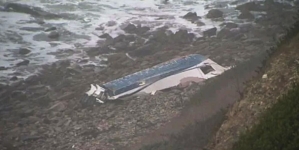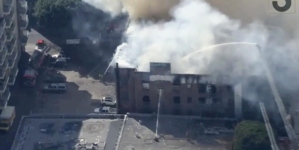-
How to Watch Seahawks vs Bears without Prime: Live Stream NFL, TV Channel - 14 mins ago
-
Tucker Gleason takes over as Toledo beats Pitt 48-46 in bowl-record 6 overtimes - 15 mins ago
-
NFL doubleheader on Christmas Day sets streaming viewership records - 22 mins ago
-
Growing speculation that plane was brought down by Russian air defenses - 40 mins ago
-
Proposed Plan to Block Donald Trump from Taking Office Sparks MAGA Fury - 55 mins ago
-
Which NFL players stand to earn over $100K (or over $1M) these final weeks? - 60 mins ago
-
Holiday crackdown nets over 100 retail theft suspects in California - about 1 hour ago
-
Fox News Hosts Sean Hannity and Ainsley Earhardt Announce Engagement - 2 hours ago
-
2024-25 College Football Playoff: Bracket, schedule, rankings, scores, more - 2 hours ago
-
Houston woman allegedly zip-tied girl, taped her mouth, and locked her in cage next to Christmas tree - 2 hours ago
Blue Lake’s City Council election ended in a tie. How would the town break it?
BLUE LAKE, Calif. — The city official held a box aloft and the packed room fell silent under the fluorescent lights of Blue Lake’s community resource center.
A longtime resident reached inside and rooted around for a manila envelope.
“Are you as nervous as I am?” the official had asked the two City Council candidates moments earlier.
While a tie in a national election might cause a constitutional meltdown — and who knows what kind of civil strife — the officials of this small town north of Eureka had a simple solution: pick a name from a box.
But that doesn’t make the results any less consequential.
“Yes, it is a quaint town. Is it dying? 100%,” said outgoing City Councilmember Angela Shull, who did not seek another term. “What I mean by a ‘dying’ town: there is no tax base, and no infrastructure, really. There is nothing to keep the town sustainable.”
After a rancorous campaign that saw seven people vie for three spots on the five-person council, the race for the final one ended in a tie. Mayor Adelene Jones and challenger Kat Napier both received 245 votes.
When Humboldt County released its final election report in early December, the tie surprised officials — and forced them to consider how to break it. Options were limited: the state’s Election Code says that a race ending in a dead heat can be decided by a special runoff election or “by lot.” But a runoff would have been possible only if Blue Lake, population 1,200 or so, had plans on the books for such a thing prior to Nov. 5. It did not.
Ties are exceedingly rare in American electoral politics — but they do happen, mostly in small local contests. Just last year, municipalities in Wisconsin and North Carolina broke tied elections with a roll of dice and a coin toss, respectively.
The Blue Lake tiebreaker may seem like just another a quirky small-town happening, but for those closest to the situation — Jones and Napier — it was painful. Both expressed frustration over the outcome. “It keeps me up at night,” Jones said before the tiebreaker. “I don’t know what to do.”
Blue Lake may be small, but it is grappling with issues faced by suburbs and big cities alike. They include the high cost of housing and the transition to green energy. A prospective affordable housing development — the city’s first — and the conversion of a mothballed power plant into a battery-storage facility sharply divided voters.
Hollowed out by the timber industry’s decline, Blue Lake has long been searching for a new identity. City Manager Mandy Mager said it is reinventing itself as a place focused on recreational tourism, touting its high-quality mountain biking trails and fishing along the Mad River.
But without amenities such as a grocery store, Mager acknowledged that Blue Lake remains a “community in transition.”
::
Blue Lake sits in a river valley surrounded by redwood-forested mountains that were draped this week in a blue haze from ranchers burning slash piles.
The proposed affordable housing project, to be built by Danco Group, would be a major addition to the city. Mager said it would include about 45 units and commercial space. It still requires approval by Blue Lake’s planning commission.
As mayor for the last eight years, Jones has been a major supporter of the project. She said that if it doesn’t go forward, the city risks being sued by the state for violating a law that includes a low-income housing mandate. But Jones said that her political opponents don’t support the housing and “need to be educated that it is a need. It’s the NIMBY folk.”
“I suppose they think they can put a kibosh on it,” she said.
Napier said she had publicly expressed her support for affordable housing, but acknowledged “concerns about the project that don’t get addressed” by the City Council, such as its effect on traffic flow. At council meetings, she said, “the mayor was dismissive of people who weren’t vocally supportive of the project.”
For Darcey Lima, 71, the Danco development would be welcome. The owner of the Dog House restaurant was cleaning up its kitchen an hour or so before the Tuesday meeting. The space was redolent of chanterelles, a bowlful of which she’d just received from a forager friend in exchange for a burger. She said some in Blue Lake “think ‘low-income’ is like a drug addict or the scum of the world. No — you’re talking about me.”
“Because,” Lima said, “if my rent goes up one more time, I’m going to have to charge $15 for a hot dog. I’m the face of low-income.”
According to observers, the election of Michelle Lewis-Lusso and John Sawatsky for two other council seats meant that a new voting bloc could upend the status quo. A win for Napier was viewed as a potential boon for that group.
::
A report prepared by city staff ahead of Tuesday’s meeting outlined City Atty. Ryan Plotz’s proposed envelopes-in-a-box tiebreaker. Before the ceremony could begin, however, people had questions. This was, after all, small-town politics — and about 50 locals had crammed into a room at the center across from City Hall.
One resident offered up a vessel to house the envelopes: a top hat from the 1800s that had been worn by a founder of the town that later became Blue Lake. But Plotz worried the envelopes could not be “sufficiently jumbled” inside it.
They’d go with a box. Wait, not quite.
A man asked why they couldn’t just flip a coin. Plotz voiced reservations: “Who gets to call it? What happens if it hits the floor and then hits something?”
The box it would be.
Napier and Jones placed slips of paper with their names written on them inside unmarked envelopes and put them in the box. Interim City Manager Tonie Quigley carried it to the center of the room, and a former city official was summoned to make the pick. She handed Quigley an envelope, who fished out the paper and showed it to the crowd.
“Kat,” it read.
And just like that, the tie was broken.
“Oh, boy!” said Napier as applause filled the room.
Blue Lake’s City Council decided a tied vote for one of its seats by drawing lots Dec 10. At left, Kat Napier celebrates her selection as outgoing Mayor Adelene Jones looks at the paper reading “Kat” held by interim City Manager Tonie Quigley.
(Daniel Miller / Los Angeles Times)
She and Jones shared an awkward hug. Before long, the choreography of a political transition began in earnest. Name placards were swapped out and Jones’ gavel was removed. The new council chose Sawatsky to be mayor. The group then turned to a dense agenda, discussing, among other things, the potential battery-storage facility.
The meeting passed the three-hour mark, and the excitement that had animated its early moments dissipated under the strain of governance. The room slowly emptied. By the time the council adjourned for a break around 10 p.m., there were only two people seated in the audience — one of them a Times reporter.
Napier stepped out onto the porch and reflected on the embrace she and Jones had shared.
“I think that was an important demonstration of unification,” she said. “It has been a tough road.”
Napier wanted to say more, but she had to get back inside. The business of Blue Lake couldn’t wait.
Source link



























